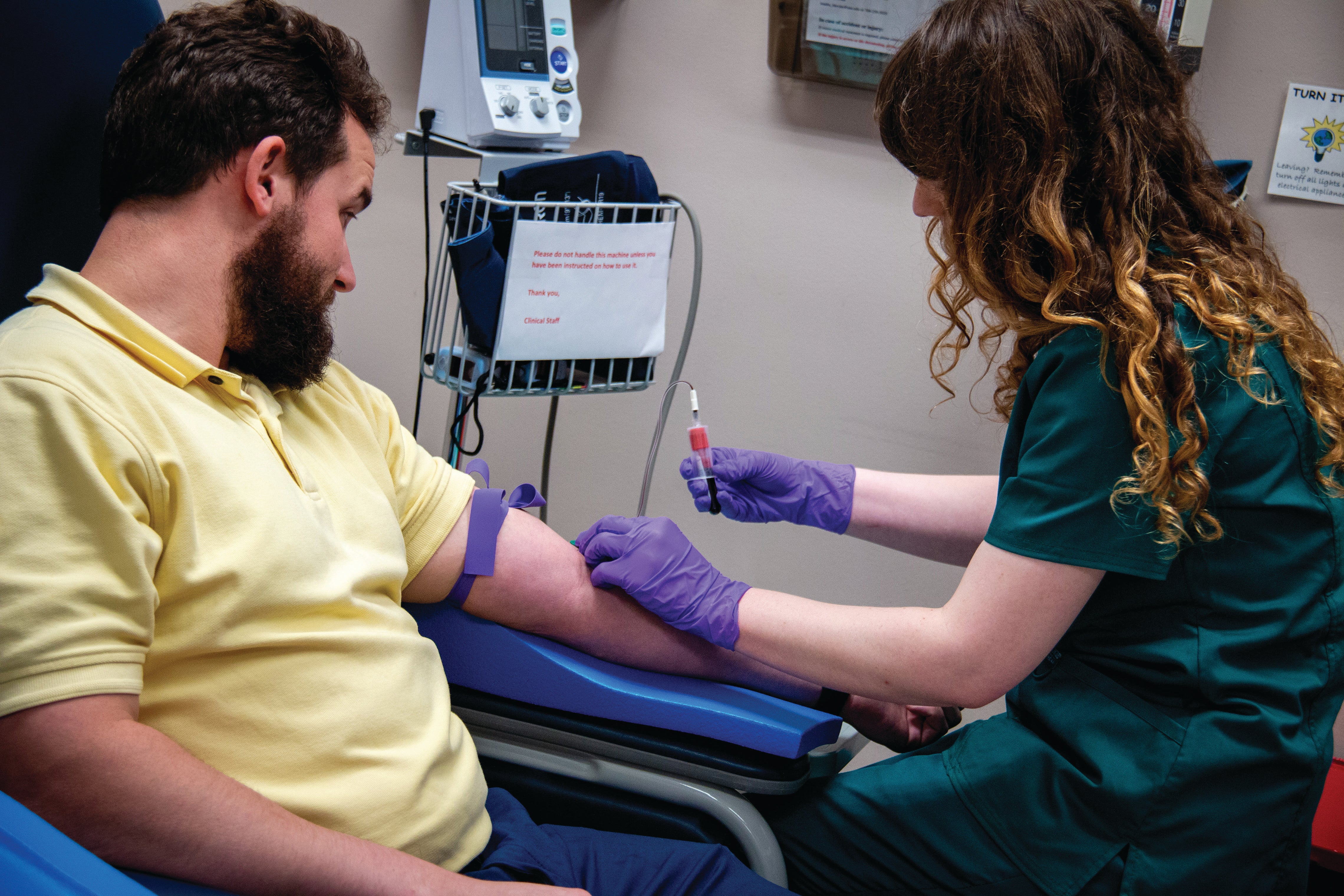Plants for Human Health Institute Starting the Year Off with a ‘BAM’
Published 12:00 am Thursday, January 30, 2020

- Photo Submitted – Research technician, Sierra Smirnov, draws blood from a study participant. The Kay lab will measure metabolites in the blood drawn at multiple time points after eating blueberries or a blueberry-protein bar to determine how the blueberry compounds are absorbed by the body.
KANNAPOLIS – N.C. State University’s Plants for Human Health Institute is kicking off 2020 with the start of its first clinical research trial, the Blueberry Absorption Metabolism study. Since its inception in 2008, PHHI faculty have conducted research on fruits and vegetables, Arabidopsis—a “model” plant, and even human cells grown in petri dishes, but this new step involves the recruitment of human subjects. Study participants will be evaluated for how certain compounds found in blueberries are absorbed and metabolized in the human body after they are eaten.
Led by Colin Kay, assistant professor in translational nutrition, the clinical trial is the final arm of a $2.2 million grant project awarded to a team of PHHI scientists in 2018 by the Foundation for Food and Agriculture Research. The earlier research components of the project, carried out by Drs. Mary Ann Lila, Mario Ferruzzi and Massimo Iorizzo, examined how the genetic makeup of a plant, specifically blueberry, spinach and banana, affects the density of bioactive phytochemicals and micronutrients. The clinical trial, getting underway this week, will evaluate bioavailability of berry polyphenols including variability due to eating a raw product, two different varieties of fresh blueberries in this case, or a processed product, which was a blueberry protein bar.
“This unique clinical study takes us beyond a simple examination of ‘how much nutrition is in a food,'” PHHI Director and principal investigator on the FFAR Mary Ann Lila said. “Instead, we are looking at how much of the health value in the food, blueberries in this case, is bioavailable, or absorbed, and can reach therapeutic targets in the human body.”
Human clinical trials involve recruitment of a qualifying population. In some cases, participants must already have a disease being studied, or in other cases, must be healthy and disease-free. There is usually a specified age range or BMI range.
Often participation involves a commitment from the participant to alter their diet or exercise over a specified period of time and to submit biological samples, including urine collections, blood draws or other medical tests. Participants may be financially compensated for their effort and their travel. Results from medical tests may also be made available to the participant, as are any published findings from the study.
“Human clinical trials are essential to ultimately prove a compound is absorbed and is biologically active,” Kay explained. Thousands of chemical reactions occur in the body as the various components of food are digested, absorbed and metabolized; processes that must occur before they impact physiological processes. This level of complexity cannot be fully replicated outside the human body. Our present work focuses on these initial digestive and metabolic processes which impact bioavailability.”
The BAM study will be recruiting 28 participants over the next three months. Researchers are fully trained in Research Ethics and Compliance to ensure confidentiality and data protection is maintained. The research is contracted with the UNC Human Research Core at the Nutrition Research Institute for on-site clinical services, a convenience afforded by the multidisciplinary nature of the N.C. Research Campus.
Human clinical trials are not new to the N.C. Research Campus. Area residents might be familiar with the MURDOCK Study, administered by Duke University, endurance sport trials conducted by Appalachian State University or cognition or choline studies performed by UNC-Chapel Hill’s Nutrition Research Institute. While many PHHI scientists have been collaborators in clinical research trials in the past, the BAM study is the first clinical trial fully managed and coordinated by faculty at the Plants for Human Health Institute.
This project involves seasoned clinical nutrition researchers who have been involved with clinical studies at multiple national and international universities prior to joining PHHI. Kay adds, “We hope this will be a launchpad for future PHHI and NCRC clinical nutrition research collaborations and initiatives.”
For more details on recruitment and eligibility for the Blueberry Absorption Metabolism study, visit plantsforhumanhealth.ncsu.edu/bam.


